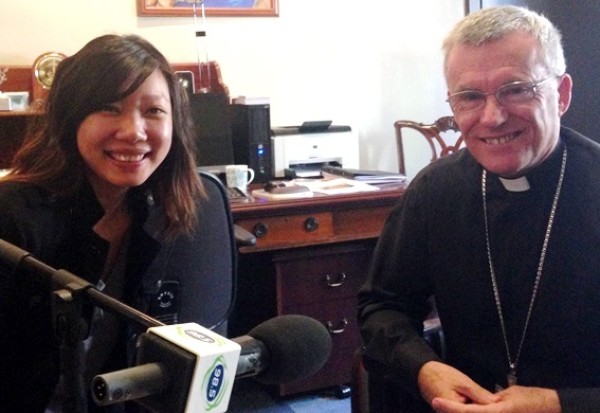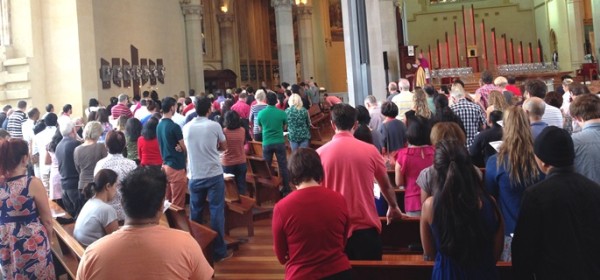Easter in Perth 2014
Journeying with us to Calvary and beyond
Hear Archbishop Costelloe’s Easter message on Sonshine Radio 98.5FM.

Archbishop Costelloe pre-records his Easter Message with 98.5FM's Chela Williams
Contemplate again on the words of Archbishop Costelloe’s homily given at the Mass of the Lord’s Supper
MAUNDY THURSDAY, 17th April
"What other people is there that has their gods so near as our God is near to us?” (Deuteronomy 4:7)
In the Old Testament, in the Book of Deuteronomy (ch4, v7), Moses is recorded as saying this to the people of Israel in an address which retells the story of the escape from slavery in Egypt:
“What other nation is there that has its gods so near to them as our God is near to us?”
Moses of course was speaking of the way in which God used his power to free the Israelites from pharaoh and of the way he led his people through the desert to the Promised Land; the Israelites knew God was with them because by night they were accompanied by a pillar of flame and by day by a pillar of cloud.
The presence of God to his people was remarkable, but it was only a hint really of the depths of God’s desire to be with his people. That desire was fully realized in Jesus. It is the absolutely unshakeable conviction of our Catholic faith that Jesus was not only an extraordinary and indeed unique man of God: much more than that Jesus was, and is, God among us as one of us. God no longer needs to be encountered in fire and in cloud. He can be encountered, and listened to, and known, and loved, in Jesus. We meet him in the pages of the gospel, both when we read the gospels at home and when we listen to them proclaimed at Mass. We meet him in our fellow Christians, especially when they themselves are in love with the Lord and reveal his face to us by the way they talk and behave. But most of all we meet him in the Eucharist when we gather, as we have tonight, to do what Jesus did on the night before he was betrayed. Just as on that night he took bread, broke it and gave it to his disciples saying, “Take this all of you and eat of it, for this is my body which will be given up for you” so at every Mass the priest, who is the living sign of Jesus among us, will do the same. And just as Jesus took the chalice and offered it to his disciples saying “take this all of you and drink from it for this is the chalice of my blood which will be poured out for you and for many for the forgiveness of sins” so the priest, in Jesus’ name, will do the same.
And then a little later in the Mass the priest will hold up the consecrated host, the lamb of God, and call us to come forward for the supper of the lamb. And in response to the Lord’s invitation we will step out of our seats and approach the altar. At that moment it would be good to remember the words of Jesus in St John’s gospel: “When I am lifted up from the earth I will draw all people to myself”. Each time we celebrate the Eucharist the Lord fulfills this promise: he draws us to himself so that we can do what he invites us to do in another part of John’s gospel: “Make your home in me as I make my home in you.” And then, as we return to our seats after having received Holy Communion we will know how truly Moses spoke when he said “what other people has its gods so near to them as our God is near to us?”
It is possible to be overwhelmed by this extraordinary reality which overtakes us every time we celebrate the Eucharist. Indeed, if we are not overawed by it all perhaps we haven’t yet begun to understand what we do when we celebrate the Eucharist. But in our awe we must not forget to ask the question “why?” Why has the Lord given us this remarkable gift? This is an important question and it takes us to the heart of our faith. Indeed we should ask the same question about the gift of faith itself. Why us? Why have we been given this gift? The answer really runs through every page of the gospels. “Love your enemies and pray for those who persecute you”; “those who do not take up their cross and follow me are not worthy of me”; “it will be hard for a rich person to enter the kingdom of heaven”; “love one another as I have loved you”; “be perfect as your heavenly Father is perfect”. These are extraordinarily high demands and they only scratch the surface of what the Lord is asking of us. How can we possibly hope to reach the standard that Jesus sets for us? The answer is, of course that we can’t – or at least not on our own. Indeed Jesus tells us as much when he says: “Without me, you can do nothing”.
But the point of the Eucharist is that we are, or need never be, without him. He gives himself to us as food and drink and through the Eucharist unites himself to us in such an intimate and close way that he begins to live within us. And as Saint Paul tells in his letter to the Philippians, “I can do all things in him who strengthens me”.
There is something within each of us which pushes us to do more and to be more. Sometimes this gets corrupted and rather than wanting to do and be more we find ourselves wanting to have more. It is very easy to fall into the trap of thinking that our happiness and fulfilment ultimately depends on what we have. The truth of course is that our ultimate happiness depends on our living our lives as God intended when he called us into life in the first place: to live our lives with integrity, with honesty, with generosity and with compassion. This is what it means to be perfect as our heavenly Father is perfect. And it seems to me in our heart of hearts I believe we all want this: to be able to live, and love, and care, and forgive, and give, as Jesus did. Selfishness ultimately brings nothing but loneliness and self-loathing. Generosity and love set us free. If we allow ourselves to be united with Christ in the Eucharist, and week by week, as we gather each Sunday, welcome him into our lives, then we will begin to see with his eyes, and listen with his ears, speak with his words and love with his heart. He will make his home in us and through his presence alive within us enable us to be all that he is calling us to be.
“What other people is there that has their gods so near as our God is near to us?”
__________________________________
The Most Reverend Timothy Costelloe SDB
Archbishop of Perth, 17th April 2014

